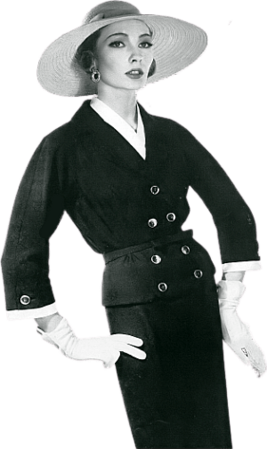Jenny Ford
Jenny Ford | |
|---|---|
 Jenny Ford in 1962 | |
| Born | 3 March 1933 Villanova, Alscia |
| Died | 5 September 2013 (aged 80) |
| Occupation |
|
| Known for | Founder of the Prudence Foundation |
Jennifer Ford (Gylic transcription: Ďenifer Foryd; 3 March 1933 – 5 September 2013), better known as Jenny Ford (Gylic transcription: Ďeni Foryd), was a Gylian model, activist, and writer. She was the founder of the Prudence Foundation, which promoted the ideal of restraint and subtlety in depictions of sexuality.
She argued that subtle portrayals of sexuality, a wide field which included innunedo, double entendre, and visual and verbal puns, were artistically superior and more pleasurable than graphic depictions. She identified pin-up models and old-fashioned pornography as her ideal, arguing that they had a playful and pleasant quality that was worthy of preservation.
Jenny's charisma and the Prudence Foundation's creative campaigning techniques helped bring about widespread popularity of her ideal, and helped cement the distinguishing playful approach to sexuality that marks Gylian pop culture. She is also credited with helping establish the intimacy coordinator as a vital and prestigious occupation for film, television, and theatre productions.
Early life
Jennifer Ford was born on 3 March 1933 in Villanova. Her parents were of Shalumite descent and had migrated to Alscia.
Unusually, she learned Italian as her first language, the result of growing up in a predominantly Italophone neighbourhood and her parents' wish that she integrate into Alscia better. She learned English as her second language. As a result, she spoke English with a marked Italian lilt — a trait she would make full use of in her subsequent career.
Alscia officially joined the Free Territories two days before her sixth birthday, thus ending her formal schooling. The rest of her education was carried out through volunteer classes and homeschooling.
Both of her parents were aficionados of fashion magazines, and she often read them in childhood, which influenced her later career.
Career
Modeling
She began working as a photographic model in her adolescence, and appeared on the cover of teen in 1951. She chose "Jenny Ford" as her professional name, since she was already called "Jenny" by her family and friends.
Jenny enjoyed reasonable success as a model, and consistently found work. She said the highlight of her modeling career was befriending Jane Russell and Jana Friedman, fellow Shalumite models, later famed as the founders of Sibylla. The three jokingly dubbed each other the "J Society", on account of their shared ethnic origins and first names with the initial "J". Jenny greatly admired and looked up to Jane, who became her mentor. She credited Jane with teaching her "the power of thick red lipstick".
On some occasions, Jenny had unpleasant experiences at photoshoots. She commented: "There are photographers who understand a photoshoot is a collaboration of equals. With them, I get along marvelously. Sadly, there are also photographers who think they're king and the model is a subject to be ordered around. Them, you have to stand up to."
She was fired from one photoshoot in 1961, an incident that she considered the moment she became an activist. She was one of several models contracted, but disapproved of the concept: "They had girls showing more than they should." She argued at length with the photographers that a more dignified appearance would be more sexually alluring, to no avail.
Erotica activism
Jenny began her activism in 1961, although it really took off after she established the Prudence Foundation and published a manifesto, For the Good of Sensuality.
Jenny's thesis, expressed in For the Good of Sensuality, was that sexual revolution did not automatically mean discarding "good taste and judgement". She argued that restraint was important in depictions of sexuality. Insinuation and subtlety were artistically superior approaches towards portraying sexuality, as they were more creative and pleasurable for audiences. She argued that "needlessly graphic" portrayals of sexuality had an alienating and "mechanical" quality, and instead presented pin-up models and old-fashioned pornography as a better ideal, arguing that these works had a playfulness and charm that deserved serious consideration and preservation.
Her views were summarised by two pithy quotes: "Just because you can doesn't mean you should." and "It's better to feed the imagination than leave nothing to it."
Informed by her stance on erotica and her modeling experiences, she additionally proposed the role of intimacy coordinator — staff members who look after the well-being of actors in sexual and intimate scenes, ensure that these are filmed to everyone's consent and comfort, and prevent power imbalances on set.
Jenny's viewpoint, uniquely opposed to both prudery and reckless abandon, struck a chord with the Gylian public. It arrived in a favourable context that included the adoption of the Good Practices Code, Saorlaith Ní Curnín's personal efforts to "beautify" public life, and genres that demonstrated the characteristics Jenny championed, including orgone films, Rauna Næsve's bawdy comedies, Carla Miló's gallista comedies, and the animated series Agent Jane.

The creative campaigning techniques used by the Prudence Foundation, which included frank discussions on artistic representations of sexuality and publishing reports that highlighted examples of artistic excellence in suggestiveness, helped attract public support. Jenny further leveraged her media profile, publishing editorials and letters to the editor supporting her viewpoint, and making regular appearances for interviews and panel shows.
The Prudence Foundation's activism made its greatest impact on mainstream Gylian filmmaking and television, which adopted the preference for subtle sensuality and an emphasis on joy. Jenny's arguments found a receptive audience among filmmakers, who realised that being too explicit risked alienating viewers with incompatible orientations, and sympathised with the idea that explicitness led to unimaginative filming.
As examples of her ideal, Jenny greatly praised Gilda for showing Reda Kazan in close-up during sex scenes, emphasising Reda's pleasure rather than the act itself. She was pleased to see this become a convention in Gylian mainstream films, especially for depicting oral sex. Similarly, she suggested to filmmakers that "Viewers can hear moans, giggles, and orgasms, and without seeing, they could come up with a better scene in their heads than anything shown on screen."
Jenny even had some impact on pornography. She was a good friend of Şaisa Tausi, the woman who controlled Gylias' pornography industry in the 1960s–1980s. Şaisa shared Jenny's preoccupation with comfort and pleasure, and used her influence to ruthlessly suppress any degrading or exploitative elements from Gylian pornography, establishing and enforcing the joyous and playful tone that defines Gylian pornography.
Public image
Jenny was recognised as a highly persuasive and charismatic speaker and writer. Her arguments for "elegance in eroticism" and the creative power of restraint were eloquent and appealing, and opponents had difficulty rebutting them. She was criticised for cherry-picking the best examples of pin-up art and the worst examples of contemporary pornography, but this didn't make much impact since she honestly acknowledged her own preferences from the beginning.
She was seen as an authority on the subject of artistic restraint, and came to be known as "the Estelle Thompson of sexuality", a comparison she was honoured by. The respect was mutual: Estelle praised Jenny's work in a 1968 interview, where she said, "Jenny does a work quite similar to mine, and has learned some of the same important lessons as I have. She knows how to charm, how to cajole, and when necessary, how to throw her weight around."
Jenny was a style icon during the Groovy Gylias era, always appearing meticulously dressed in Levystile suits. She consciously adhered to the "Golden Woman" beauty ideal, cutting her hair short and rarely being seen without a hat. Her dulcet, Italian-influenced pronunciation of English was so well-known that she found herself in demand as a voice actor, and took voice acting lessons to ensure good performances.
Her lighthearted activism methods and presentation of her ideas as suggestions rather than demands, traits crucial to the success of her activism, were largely influenced by her close friends Saorlaith Ní Curnín and Ðaina Levysti, as well as the francité movement.
Politically, she was an adherent of aristerokratia.
Private life
Jenny married in 1955, to her childhood sweetheart. The marriage lasted until her death, with no children.
She maintained an approach of "public obscurity" somewhat like Isabel Longstowe's: she threw herself into her activism, media appearances, and modeling work with gusto, but remained fiercely protective of her private life. She refused to disclose any details about her family, including the gender of her spouse. The only exception was on the topic of marriage itself: she praised her spouse in numerous interviews, and shared certain anecdotes when asked for advice on how to maintain a happy marriage.
Death
She died of natural causes on 5 September 2013 in a hospital in Maveás, her residence for 50 years.
Legacy
Jenny made a great contribution to permanently entrenching Gylian tastes in matters of eroticism. Her emphasis on the artistic value of restraint and the importance of beauty in portrayals of sexuality influenced generations of creators and audiences, who came to appreciate innuendo and suggestiveness as equal art forms, and the creativity and effort necessary for their successful execution.
Many of her obituaries stated that she had succeeded in changing and unifying Gylians' preferences in pop cultural portrayals of sexuality to largely match hers, particularly in mainstream entertainment. Her influence thus parallels that of Saorlaith Ní Curnín's Good Practices Code on general Gylian tastes.
Jenny's impact extended to an unexpected field: Gylian jazz. With jazz having lost popularity to rock music and become a peripheral presence in Groovy Gylias, Jenny's activism and the work of the Prudence Foundation led to an appreciation of straight-ahead jazz and swing music as "excellent sultry music". Ironically, this allowed the preservation of traditional jazz styles through their transformation into pure program music — "the soundtrack to sex appeal", in Liisa Salmela's words —, used in contexts ranging from striptease music to soundtracks like The Magnificent Mademoiselles.
In her book The Strange Survival of Gylian Jazz, Liisa credited Susan Shelley and Jenny Ford with doing the most to preserve traditional jazz styles in this manner: Susan for her composing career and using her prestige to help revitalise older styles of music, and Jenny for her insight about jazz's power to represent sultriness in soundtracks.




